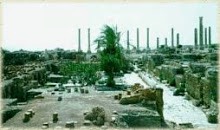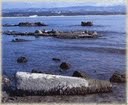Tyre was the maritime equivalent of Babylon. Carthage, a rival of Rome, was only a colony of Tyre. When Tyre was at the height of its power, the prophet Ezekiel prophesied this:

And they shall destroy the walls of Tyrus, and break down her towers: I will also scrape her dust from her...and they shall lay thy stones and thy timber and thy dust in the midst of the water...And I will make thee like the top of a rock: thou shalt be a place to spread nets upon; thou shalt be built no more: for I the LORD have spoken it, saith the Lord GOD (Ezekiel 26:4,12,14).
The destruction of Tyre could have been plausible. However, the prophecy that Tyre would be thrown into the midst of the sea, and its former location be scraped like the top of a rock seemed more than implausible. Yet both these prophecies were fulfilled. Nebuchadnezzar of Babylon besieged the city and conquered it. The inhabitants of Tyre, however, escaped to a nearby island. Nebuchadnezzar then rendered the city to ruins. For two and-a-half centuries, these ruins were a mute contradiction of the Bible.

When Alexander the Great conquered the Medo-Persian empire, long after Nebuchadnezzar's siege, the new island city of Tyre resisted his advances. Frustrated by their efforts, Alexander ordered his troops to build a causeway to the island by throwing the ancient ruins of mainland Tyre into the midst of the sea, and using the dust to create a way for his troops, thus fulfilling the prophecy that Tyre would be thrown into the midst of the sea.
The scraped rocks and sunken causeway of ancient Tyre declare with emphasis to this generation that the Bible is more than just an ordinary book.
Tyre and the Bible